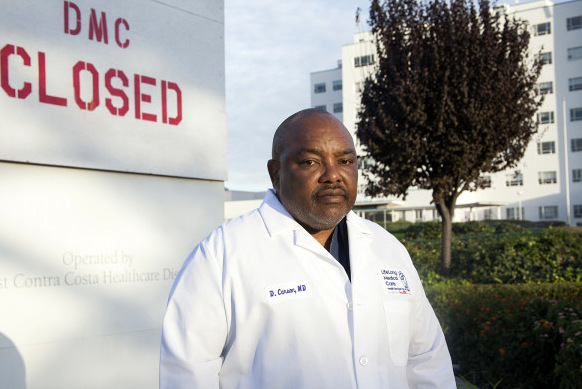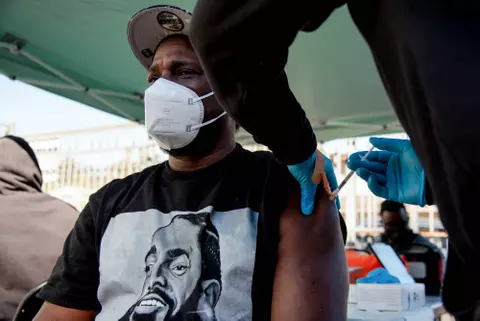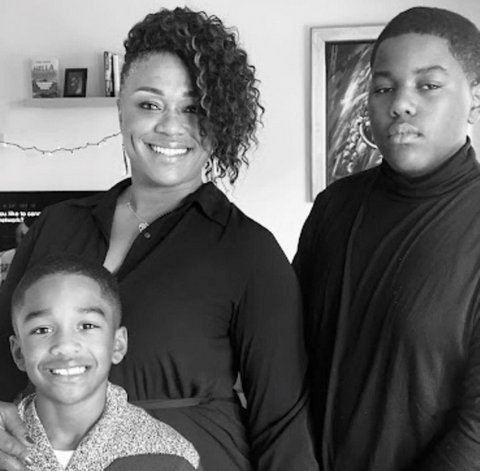
25 Jan ‘Time Will Always Tell’: Doctor Addresses Coronavirus Vaccine Concerns

Dr. Desmond Carson outside the former Doctors Medical Center in 2015. (Brittany Hosea-Small / Richmond Confidential)
Interview, Malcolm Marshall
Editors Note: Dr. Desmond Carson of Lifelong Medical Care — a nonprofit that offers health and other services to underserved members of the community — answers lingering questions about the COVID-19 vaccines and the pandemic. This conversation has been edited for length and clarity.
The CC Pulse: How does this vaccine work?
Desmond Carson: Most vaccines work by putting some form of the bacterium or virus inside of you. And then the body will recognize it as nonself and will reproduce a plethora of more cells to fight it. Now, you have an army of T cells that says, “As soon as I see that head pick up a little a piece of my body I’m going after it.” That’s your temperature and stuff like that when your body is fighting.
This is a new mechanism. We know that viruses multiply by mRNA [messenger ribonucleic acid], whereas human beings reproduce genes and proteins using DNA. So when the RNA of this virus — the genetic coding material for all of the proteins in the virus, i.e., everything the virus needs to stay alive — enters our body, it will make the RNA for that virus, the proteins. Then, our body will see that protein as foreign and will fight it.
RP: What do these new variants mean for the currently developed vaccines?
DC: The different companies are producing different proteins that come from the same mRNA from the virus of COVID-19. mRNA can change, meaning you can get a change that will not kill the virus, but will make the virus a little different.
I just don’t know, but time will tell on these things. There is a lot of unknown, let’s be honest. I don’t want to be that arrogant about it.
RP: How concerned should people be about bad reactions or side effects from the vaccine?
DC: Well, anytime you put something in you that’s made by a human being, you should be concerned. I would be concerned always. I know Black people, in particular, and the community, in general, have anxiety around taking this immunization because we know that, as Black folks, we’ve been used as experimentation.
Nothing is 100% safe, so, of course, some people will be nervous. People will say, well when will we know? Time will always tell. Has there been research? Of course, there has been research.
Before I took the vaccine, I was anxious as anybody else. There were some articles done about research on the side effects, the problems with the vaccine, namely the one that came from Pfizer in the New England Journal of Medicine. And they said after one month, after three months and after, like a nine-month timetable, it was obvious the vaccination was working and that it was preventing the virus. So the study was pretty consistent. The only problem is that Pfizer is the one that funded the study. So you just gotta keep that in mind when you read it.
RP: Are there groups of people who don’t need or shouldn’t get the vaccine, such as pregnant women or people who have already had COVID-19?
DC: We don’t know if those who had COVID-19 have long-term immunity. That is still a big question. Usually if you have an infectious disorder, you would think that you would have some sense of immunity, but the word is still out. The word is still out on pregnant women and whether or not we should vaccinate children. I’m not aware of anybody who absolutely should not get it, outside of the people who have known allergies to vaccines.
The people who they are giving the vaccine to are those at highest risk. Namely, the elderly, those with pulmonary disease, diabetes, HIV, any type of disease that puts you at risk for communicable disease disorders. The next group at risk is providers because we’re the ones around the patients coming in with the symptoms.
Then, the next group of people they’re going to try to do, I think, is going to be teachers, so we get the kids back in school. And then the population at large. With Black people dying twice as much and Latino people dying three times as much, they should be first in line. Still, people are going to shy away out of fears and anxiety towards immunizations and the medical community.
RP: What needs to happen for it to be safe for people to stop physical distancing and wearing masks?
DC: You’re still going to have to wash your hands.
We’re having 3 or 4% of hospital beds available because of this. The intensive care units are so full that we don’t even have beds for people who need them. They’re starting to say we don’t have oxygen. This is where we’re at. When we get to the point we have no patients in hospitals for COVID-19 and it’s down to less than 1 or 2% in the community, then I think we’ll be down to say, “Yeah, I think it’s safe to open up.”





No Comments